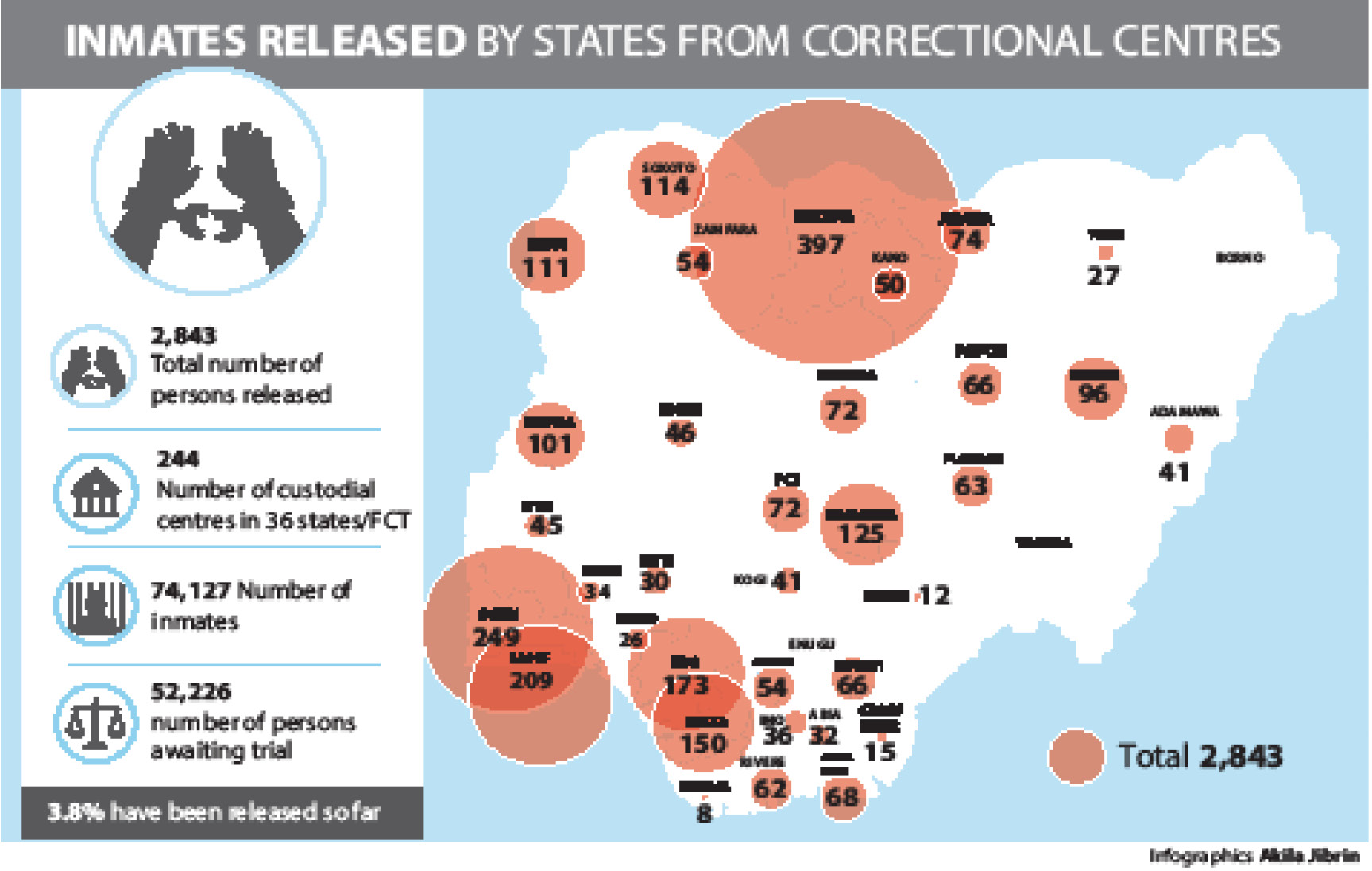The 2,843 inmates so far released by the federal and some state governments is not enough to decongest custodial centres in the country, experts told the Daily Trust on Sunday.
Authorities said there were 74, 127 inmates in the 244 custodial centres in the 36 states of the federation and the Federal Capital Territory (FCT) before the recent release of some of those with lesser crimes.
Between February and April, 2020, only 2, 843 inmates were released as part of efforts by governors and chief judges to exercise their constitutional powers to decongest prisons during the COVID-19 outbreak, a tally of the releases by relevant authorities have shown.
READ: Prison decongestion in Nigeria
Considering the number of those released so far, it means only 3.8 percent have been released. Bayelsa, which released only 8 people during the time under review is at the bottom of the ladder while Katsina topped the table after releasing 397 inmates.
President Muhammadu Buhari had on April 21 called for the urgent trial of cases and decongestion of prisons in the country in the light of COVID-19 pandemic.
READ: Need for Executive Order to decongest correctional centres
He said the United Nations advised countries to “consciously reduce the population of prison inmates since physical distancing and self-isolation in such conditions are practically impossible.”
A memo posted on the website of the Nigeria Judicial Council (NJC) on Friday, May 15, which was addressed to state chief judges, the Chief Justice of Nigeria, Justice Tanko Muhammad, ordered them to ensure a speedy trial of criminal cases to ease overcrowding in prisons.
He urged them to “consider the conditional or unconditional release of awaiting trial persons who have spent six years or more in custody.”
He also said his directive was in line with the call by the United Nations on countries “to consciously reduce the population of inmates since physical distancing and self-isolation in such conditions are practically impossible” during the ravaging COVID-19 pandemic.
The CJN, who decried the increasing number of awaiting trial inmates, said, “From available records, the inmates population at various custodial centres across the country presently stands at about 74,127, out of which 52,226 are awaiting trial persons.
“Most of these custodial centres are presently housing inmates beyond their capacities and the overcrowded facilities pose a potent threat to the health of the inmates and the public in general, in view of the present circumstances, hence the need for urgent steps to bring the situation under control.”
Mohammed, therefore, directed CJs to “embark on immediate visits to all custodial/correctional centres within your respective states to identify and release deserving inmates, where that has not been done already.”
How FG sets the ball rolling for decongestion
The federal government had earlier announced plans to release 2, 670 inmates from the correctional centres under a presidential pardon.
Section 175 of the Nigerian Constitution, 1999 empowers the president to grant pardon, in conjunction with the Council of State, to any person convicted of any offence created by an Act of the National Assembly.
Similarly, Section 212 of the constitution gives governors of states such powers, while Section 21 of the National Correctional Service Act, 2019 designates chief judges as visitors of custodial centres in their various states. Thus, they can visit and conduct jail deliveries there from time to time.
Causes of the delay in releasing inmates
Analysts are of the view that in addition to the 2, 843 released so far by various state governments, custodial centres need to be freed further to save them from becoming breeding grounds for COVID-19.
The Executive Director of Citizens United for the Rehabilitation of Errants (CURE), Sylvester Uhaa, said the people released so far were grossly inadequate.
He alleged that the attention of state governors was not on prison reforms because they were not in charge of funding the facilities including feeding and welfare.
“Additionally, prison decongestion is a business for many people who will do everything including advising the governors against decongestion.
“Prisons in Nigeria as in many places globally are industries and are protected by capitalists who make huge profits from them.
“These people are frustrating our efforts to achieve prison reforms and decongestion,” he said.
He called on the government to sanitise the procurement process in correctional centres to achieve remarkable results.
Speaking on the matter, a former Deputy Director-General of the Nigerian Law School, Prof. Ernest Ojukwu, said some of the chief judges were already implementing the guidelines of the UN/WHO, which is part of their constitutional powers to make jail deliveries by releasing certain categories of detainees and inmates at correctional centres.
“If the chief judges use this power substantially, it will effectively decongest correctional centres temporarily for the purpose of the fight against COVID-19 fight.
“But it is important that the federal government provides immediate palliatives for those to be released otherwise the releases will be counter-productive.
“Releasing these detainees in an organised manner including provision for temporary accommodation, transportation and feeding for them is as important as releasing them immediately.
“I also hope that this call by the president is a wake-up call for the judiciary in conjunction with the executive arm of government to take necessary steps to address the long-term access to justice needs and correctional centres congestion and welfare of detainees and inmates.
“It is a fundamental rights challenge that our judiciary has failed woefully so far,” he added.
‘States must fast-track the decongestion process’
Experts spoken to said relevant authorities must adopt more measures to ease congestion in prisons as community transmission of COVID-19 continues to take its toll across the country.
According to them, correctional centres or custodial centres are usually crowded and unhygienic with the number of those incarcerated above the capacity of such buildings, thereby paving the way for incubation and the spread of avoidable diseases.
Several human rights bodies have expressed concern that the custodial centres could serve as avenues for fast community transmission of the virus considering the poor spacing in the facilities.
They, therefore, called on President Muhammadu Buhari and the 36 state governors as well as the minister of the Federal Capital territory to look at the possibility of releasing and rehabilitating more inmates without compromising national security.

Richard Ebie Esq., said decongestion of custodial centres could only be achieved through the states as most offences were not federal but state offences.
“The bulk of the offences created in the Criminal Code applicable in the South and the Penal Code applicable in the North are actually state offences.
“Thus, with only a few exceptions, the state governors can decongest the prisons.
“Besides the president’s power to pardon offenders, every state governor also has the prerogative of mercy to pardon a person convicted of an offence in his state.
“This power can equally be utilised by them to further decongest the prisons,” he added.
Decongestion is an ongoing process- NCoS
The Public Relations Officer of the Nigerian Correctional Service (NCoS), Chucks Njoku, said prisons’ decongestion programme is ongoing as there was no deadline for state governments to implement the directives by President Buhari.
“No time frame was given to them (state governments); we have given them the list of inmates we think they can release but they have to review it also,” he told the Daily Trust.
Njoku said he was not in a position to know why state governments were taking their time to implement the release of the inmates, adding that governors that have not effected the release of the inmates in their state “may be busy with other schedules for now.”
When asked if the delay would defeat the intention of the government to prevent COVID-19 outbreak in the custodial centres as a result of overcrowding, he said the NCoS was happy with the number of releases made so far.
What states have done so far
Though many states answered the clarion call of the president to decongest jails in their states, checks by the Daily Trust showed that only a few inmates got the privilege of regaining their freedom.
In Yobe, the state Commissioner for Justice and Chairman Prerogative of Mercy Committee, Barrister Saleh Samanja, said the release of the inmates, which was at the instance of Governor Mai Mala Buni, was in line with the presidential directive to decongest correctional centres in the country.
The Attorney General and Commissioner for Justice in Sokoto State, Suleiman Usman, SAN, urged those released to lead a reformed life.
In Lagos, Governor Babajide Sanwo-Olu said that the action was taken to decongest correctional centres in view of the dreaded coronavirus pandemic and also part of a larger effort to bring lasting reform to the administration of criminal justice in the country.
In Rivers State, the Chief Judge, Justice Adama Iyayi-Lamikanra, urged those released not to go back to crime “because next time you might not be that lucky.”
Releasing 249 inmates in Abeokuta, the Chief Judge of Ogun State, Justice Mosunmola Dipeolu told the discharged inmates to go back and be useful to society and the entire nation.
In Kebbi State, the 111 inmates who were released in April received the sum of N10, 000 each from the state government.
The exercise was performed by the state Attorney General and Commissioner for Justice, Ramatu Adamu Augie along with the Chief Judge of the state, Justice Muhammad Ambursa in Birnin Kebbi and Argungu Correctional Service Centres.
FG’s guideline for release of inmates
The Minister of Interior, Rauf Aregbesola before the release of the inmates that regained their freedom recently, listed the guidelines for different categories of inmates who will qualify for amnesty during the COVID-19 pandemic.
These include convicts who were 60 years and above; convicts serving three years and above with less than six months to serve; inmates with ill-health likely to terminate in deaths; inmates with mental ill-health; and inmates with option of fine not exceeding N50, 000 with no pending case.
Others were convicted pregnant women, convicted women with a child, convicted inmates with minor offences, and convicted inmates who spent 75 per cent of their sentence after remission.

 Join Daily Trust WhatsApp Community For Quick Access To News and Happenings Around You.
Join Daily Trust WhatsApp Community For Quick Access To News and Happenings Around You.


